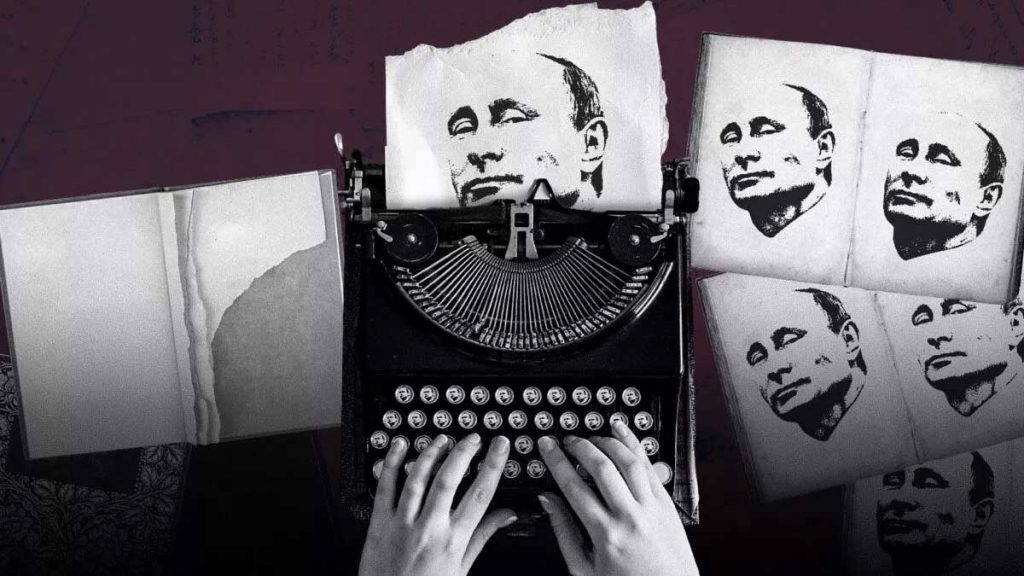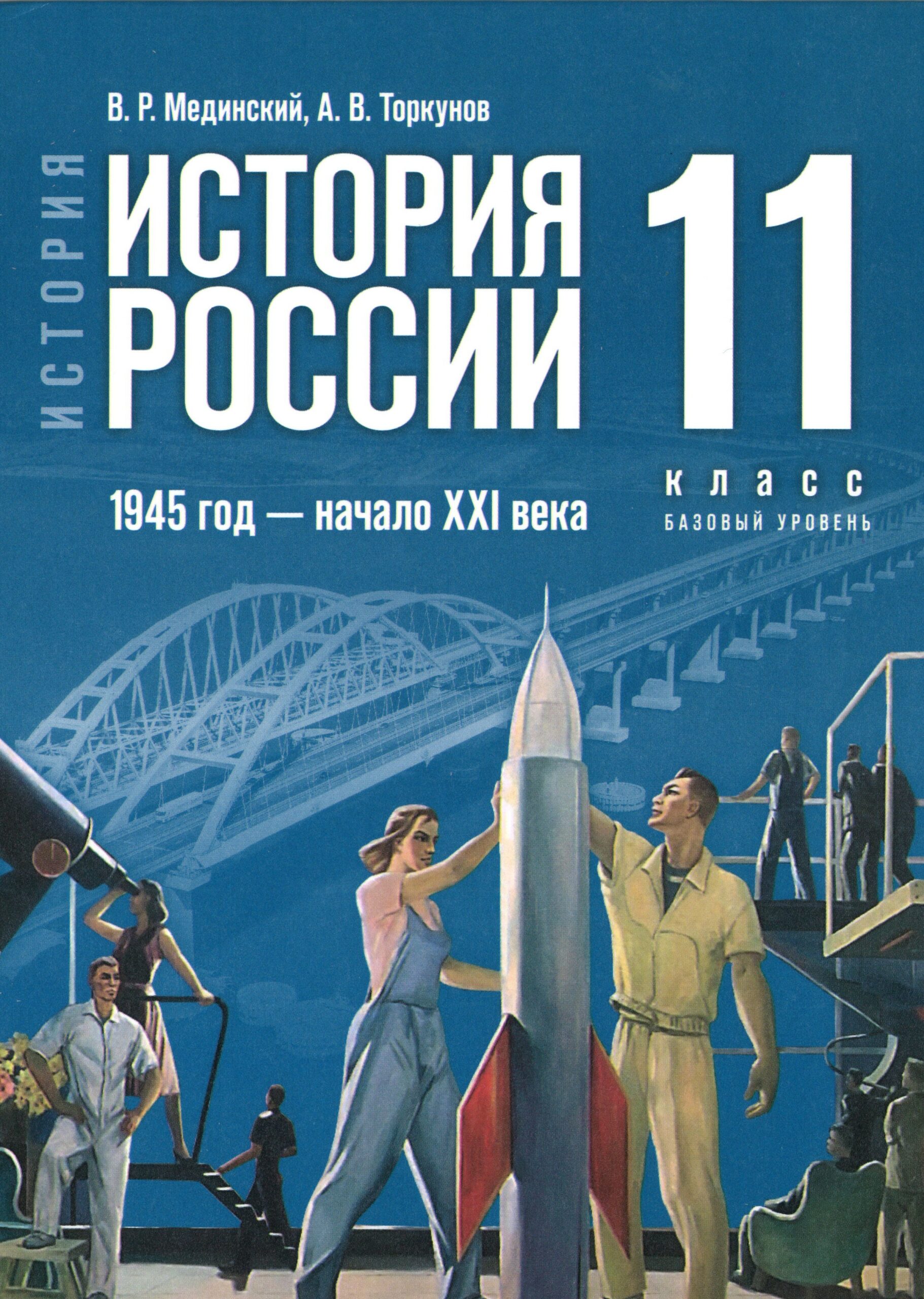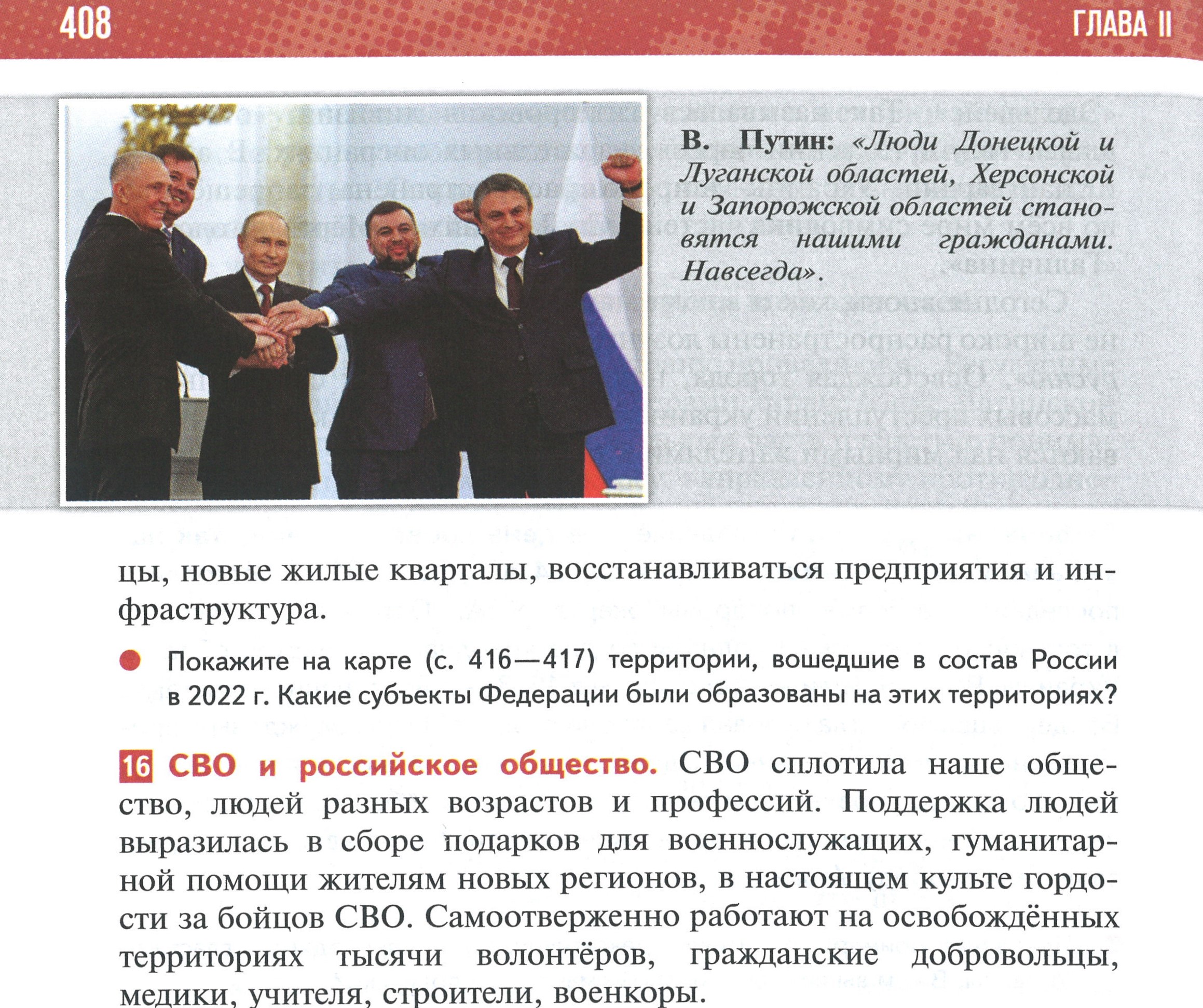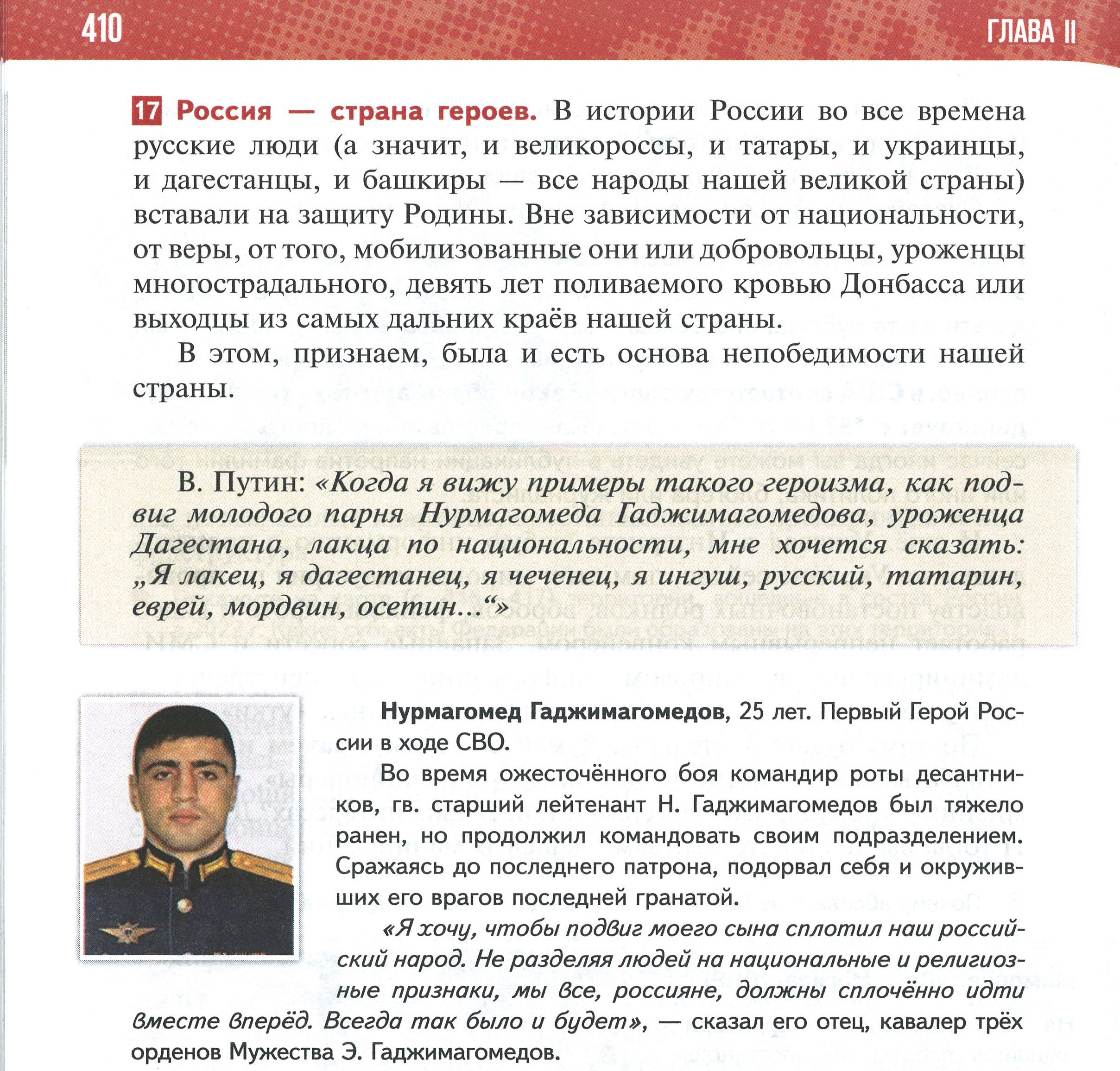Historical revisionism takes many devious forms in Russia. One of the most blatant Kremlin’s attempts to of manipulation is the re-writing of school history books, filling them with lies and pro-Kremlin disinformation. In recent years, the Kremlin’s propaganda has repeatedly accused the West and neighbouring countries of “historical revisionism”.
Table of Contents
By EUvsDisinfo | February 16, 2024 —
According to Putin, the West deliberately falsifies history in order to weaken and humiliate Russia. Meanwhile, Russia protects and promotes the “true history” – all other countries have a distorted vision of the only “true” history kept by Moscow. In 2023, the Kremlin decided to react to Western “historical revisionism” with a very peculiar step – the official revision of Russian school history textbooks. In other words, replacing facts with fiction, based on the core disinformation narratives the Kremlin has propagated for years. The first red flag: the “revision” was carried out by Putin’s political lackeys, not actual historians.
Putin’s new history textbooks
Putin first started the discussion about the need to revise school history textbooks as far back as February 2013. According to him, the “textbooks should not contain internal contradictions and double interpretations”.
In August 2023, the Russian authorities presented the new revised edition of history textbooks for 10th and 11th-grade students. The textbooks were revised under the supervision of Vladimir Medinsky, a former minister of culture and the head of the Russian Military Historical Society. The textbooks were co-edited by Anatoly Torkunov (rector of the infamous MGIMO University preparing Russian “diplomats”) and 92-year-old Aleksandr Chubaryan (head of the History Institute of the Russian Academy of Sciences).
The revision is not over: by 1 September 2024, the editorial team is planning to present updated textbooks for 5th-9th grade students.

The main radical changes, which were realised in the revised history textbooks, concern the period of the USSR’s collapse, Putin’s rule and the ongoing war against Ukraine. These changes promote two main narratives – the “evil West” always trying to destroy Russia, and Moscow having all the political and ideological reasons to start the “righteous” war against Ukraine.
“Evil West” encircling and destabilising Russia
The “evil West” narrative reflects numerous statements by Putin on this issue. First of all, the collapse of the USSR was the “greatest geopolitical catastrophe” of recent times, a result of unfriendly Western actions. At the beginning of his rule, Putin was open to cooperation with the West, but it kept having hostile plans against Russia. The textbook directly declares that “the goal of the West is to break down Russia and establish control over its resources” and “the destabilisation of Russia became the idée fixe of the West”. Of course, this is a classic case of projection – attributing Russia’s own actions to its perceived adversaries.
The textbook promotes the message that the Cold War never ended – the 1990s was simply a short break in the West’s confrontation with Russia. In this way, the West keeps trying to weaken, subordinate and destroy the Russian state. Once again, the Kremlin’s obsession with building a siege mentality and creating the perception of external threats, such as the so-called NATO expansion, becomes apparent.
War against Ukraine – the sum of all the Kremlin’s disinformation narratives
The main changes in Russian history textbooks are clearly connected to Ukraine, relentlessly repeating the Kremlin’s distorted disinformation narratives about the war. The new textbooks are quite unique. Unlike the previous editions, now these new ‘history’ books include entire chapters dedicated to recent domestic developments in Ukraine. Even the cover of the 11th-grade textbook has a picture of the Crimean Bridge, symbolically underlining Putin’s “triumph” in Crimea.

The authors of the textbooks were not “creative” at all regarding Ukraine – they simply composed all the key Kremlin propaganda messages regarding the war:
- Ukraine is a hostile “ultra-nationalist neo-Nazi state” which endangered Russia with its plan to join NATO and obtain nuclear weapons;
- the goals of the Russian “Special Military Operation” are to defend Donbas and proactively protect Russia’s security;
- Russia had all the reasons to launch the “Operation” because the USA and NATO started to prepare Ukraine as the main battering ram against Russia. The Kremlin was simply forced by Ukraine and the West to take this step.
The history textbooks contain numerous other pro-Kremlin messages, such as the 2014 “coup” in Kyiv, the functioning of the American “biolabs” in Ukraine, “illegal” Western sanctions, Western mercenaries fighting against Russian soldiers, etc.
The practical tasks and questions for school students regarding Russia’s war against Ukraine include:
- show on a map the territories that became part of Russia in 2022;
- present examples of heroic deeds of Russian soldiers taking part in the “Operation”;
- answer the questions “why does Ukraine play a key role in the ideological confrontation between the West and Russia?”, “what were the Ukrainian threats to the population of Crimea?” and to find examples of anti-Russian Western policies realised in Ukraine.

The textbook promotes a clear message that the “Special Military Operation” united Russian society: Soviet and Russian soldiers have always been ready to lay down their lives for the Motherland. In fact, we have kept a close eye on this inherently manipulative attempt to extend the “Great Patriotic War”, as WWII is known in Russia, depicting Russia’s war against Ukraine as a continuation of it and portraying Russian invaders as heroic fighters against Nazism.
Political consequences of Putin’s historical mythmaking
The character of changes in Russian history textbooks clearly shows Putin’s desire to “adjust” the recent history of Russia to the main narratives of the Kremlin’s propaganda. Russian authorities desperately need to find an ideological justification for their actions in Ukraine. This goal is achieved through clumsy and illogical historical mythmaking.
Putin’s message to Russian youth
The Kremlin presents to Russian youth its own picture of the “new” Russian history. In this picture, Russia has always been besieged by the “evil West”, while Putin is presented as a “collector of Russian lands”, similar to Peter the Great, Catherine the Great and Joseph Stalin. Putin’s message to the youth is direct and clear: it is an honourable obligation for young Russians to give their lives for his personal imperial ambitions. Russian school students in the 10th and 11th grades will soon become soldiers, so the Kremlin wants the school system to prepare them for their future role of cannon fodder on the Ukrainian front. In this way, the Kremlin clearly uses this historical revisionism as a tool to justify its aggressive actions and indoctrinate the next Russian generations.
No alternatives to Putin’s “history”
The new Russian history textbook is obligatory for the school system. Russian history teachers have been turned into “textbook repeaters” who have no right to provide any alternative opinions and form their own programmes. In this way, Russian school students can only find the “true” historical answers in the new Kremlin-made textbook.
Foundation for future conflicts
The indoctrination of new Russian generations with Putin’s “history” lays the foundations for future confrontations and wars between Russia and its alleged “enemies”. The new textbooks sow hatred towards “non-Russians”, manifest Russian superiority and justify Russian imperial ambitions. The disastrous results of this “patriotic” indoctrination of Russian youth may only appear decades after Putin’s death.

“True” Russian history for neighbouring countries
As it appears, Putin has plans to spread the “true” history written by his state functionaries not only within Russia, but also in neighbouring countries. In February 2024, the Russian ambassador to Belarus stated that the Belarusian and Russian authorities had agreed to create unified history textbooks. These “unified” textbooks should present the history of the Russian Empire and the USSR “from a single point of view”. Without any doubt, this “single point of view” will be Putin’s imperialist attitude, which should replace the Belarusian perception of history. In fact, the militarisation of minors via ideologically tainted schoolbooks is already well under way in Belarus.
In this way, the Kremlin continues its war with history using open historical revisionism. Putin’s new “history” should have no alternatives, not only in Russia, but also in those countries currently controlled or occupied by Moscow.










